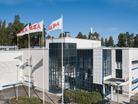ABB: Behind Industry First Environmental Product Declaration

ABB has broken new ground in the electric motor industry by launching the first-ever Environmental Product Declaration (EPD) for large motors, a comprehensive document that details the environmental impact of a product through its lifecycle.
This EPD, aligned with ISO 14025:2006 Type III standards, covers ABB's AMS 1120 series of synchronous motors, which are commonly used in gas and air compression for Liquefied Natural Gas (LNG) operations and other industrial applications.
The new EPD marks a step towards greater transparency in emissions reporting, allowing businesses to evaluate the environmental impact of ABB’s large electric motors more effectively.
Unpacking the EPD’s impact on transparency and emissions
EPDs are third-party verified reports providing detailed information on a product’s environmental footprint from design to disposal.
ABB’s EPD offers a thorough look at CO2 emissions across each lifecycle stage of the AMS 1120 motor series, helping customers make informed decisions that align with sustainability goals.
Verified by a third party, the EPD covers everything from raw material extraction and manufacturing to usage and end-of-life disposal, providing ABB customers with a reliable dataset to evaluate the environmental credentials of their machinery.
One of the key insights from the EPD is that the “use phase” accounts for 99% of the motor’s lifetime CO2 emissions. This phase includes emissions generated during the active use of the motor in industrial settings.
For large electric motors like those in the AMS 1120 series, this stage significantly influences total emissions - equivalent to 2.4 megatons of CO2.
The data highlights the critical importance of improving energy efficiency and selecting cleaner energy sources during this phase to minimise the motor’s environmental footprint.
In addition to usage, the upstream phase, which includes raw material extraction and the production of intermediate components, also makes a noticeable impact, accounting for approximately 279 tonnes of CO2.
Together, these figures highlight the substantial potential for emission reductions by optimising energy use and sourcing renewable electricity.
ABB’s commitment to a low-carbon future
ABB, a global technology leader in electrification and automation, is leveraging this EPD to advance its long-standing commitment to sustainability.
ABB Motion, the company’s division focused on motors and drives, has been at the forefront of innovating energy-efficient and low-carbon solutions.
This EPD reaffirms ABB’s commitment towards sustainability and transparency.
Publishing the first EPD for large motors marks a significant milestone in our industry’s journey towards a low-carbon society.
By publicly sharing information about the AMS motor and other future products, we are empowering our customers to evaluate the environmental footprint of electric motors and make informed choices which align with their sustainability objectives.
This transparency is part of ABB's broader vision, known as “Engineered to Outrun,” which aims to help industries maximise efficiency and sustainability while maintaining high performance.
With more than 105,000 employees worldwide, ABB has established itself as a leader in designing solutions that reduce energy use, lower emissions and contribute to a circular economy.
ABB’s presence spans over 140 years, during which the company has pioneered electrification technologies to support sustainable industrial practices across various sectors.
Future compliance and reporting requirements
The publication of ABB’s EPD also signals a proactive approach to evolving environmental regulations and reporting standards.
In particular, future regulations, such as the EU eco-design directive and emerging non-financial reporting requirements, are likely to affect companies across the United States, the United Kingdom, Switzerland and EU stock markets.
By publishing its EPD now, ABB positions itself to better meet these standards, which will require companies to provide greater transparency about the environmental impact of their products.
The EPD aligns ABB’s products with anticipated regulatory requirements, ensuring that customers have access to data-driven insights for more sustainable product choices.
ABB’s EPD also sets an example for other manufacturers, encouraging the industry to adopt similar transparency practices.
The EPD format enhances transparency and offers a robust framework for industry compliance as ESG factors continue to influence corporate strategies and reporting obligations.
With EPDs anticipated to become a staple in non-financial reporting for publicly listed companies, ABB’s initiative could help establish these declarations as a new norm in manufacturing, especially within sectors with significant energy demands.
By setting this industry benchmark, ABB is laying the groundwork for more sustainable industrial practices, inviting other companies to follow suit and enhance their own transparency efforts.
ABB’s step towards sustainability through this EPD underlines the role of energy efficiency and renewable energy in decarbonising industries.
Make sure you check out the latest edition of Manufacturing Digital and also sign up to our global conference series - Manufacturing & Mobility LIVE
Manufacturing Digital is a BizClik brand.
- Manufacturing Unwrapped: Inside IKEA, The Wonderful EverydayProduction & Operations
- Shell & Equinor Deal: Implications for Manufacturing SectorSustainability & ESG
- Unilever Speaks on Failure of Global Plastics TreatySustainability & ESG
- Primark & H&M: Pursuing Textile Manufacturing CircularitySustainability & ESG



